Author: Emily Neuharth
Location: Cambridge, England
Pronouns: She/Her/Hers
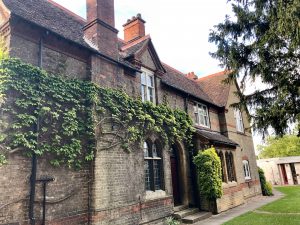
Westfield House
The academia of Cambridge was certainly one of the factors that drew me to its study abroad program, and as a lover of language, I knew that England would have much to offer. Valpo’s Cambridge program is unique in that we actually can take courses from up to five different colleges! I have been challenged by the British education system in ways that my prior academic experience has never been able to.
Essentially, the only grade I got for three out of my four courses relied solely upon a final paper. Fortunately, as a Creative Writing and Humanities student, this structure was fairly similar to classes I have taken at Valpo, but it was entirely foreign to some of my fellow Cohort members. That being said, I did not fully realize until now how structured my studies at Valpo really have been, and how much those smaller assignments throughout the semester can really take some of the pressure off of the final paper or exam.
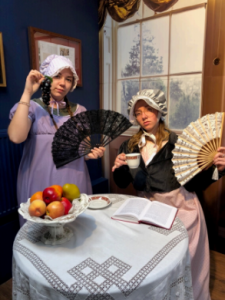
Demi and I at the Jane Austen Center in Bath, England on one of our (many)
British Life and Culture trips.
The best and worst aspect of my courses this semester has been the lack of structure. As someone who works best when under pressure, it would be an understatement to say that my procrastination has always been my downfall. While the lack of professor-enforced drafts and mini-deadlines meant a lot less busy work on my part, the tradeoff was my needing to manage my time well— which was honestly one of the most difficult parts of my semester abroad.
But on the other hand, there were many pros to this academic system. In addition to forcing me to grow in the time management area of my life, it also made it possible for me to travel mainland Europe, explore Cambridge deeper, and invest more time and energy into the new relationships I have formed while here. Furthermore, this lack of structure also gave me a great deal of freedom to choose the topics which I would research and write about for my final papers.
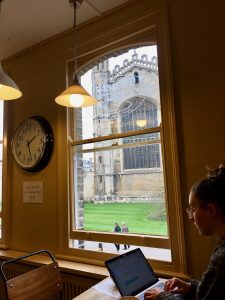
Nolan snapped this photo when we were working on our final British Life and Culture
papers at a favorite coffee shop (Benet’s) across from King’s Chapel.
Below are the courses that I took this semester, and the theses of my final papers to give a general idea of what I learned and wrote about.
Sociology: Modern Societies (Lectures at Cambridge University, Supervisions through Westfield House)
Thesis: Shaping gender and sexuality to be perceived as heteronormative is silent systemic oppression which has been (and still is) implemented to ensure that traditional forms of power remain uncontested; thus, deconstructing these concepts until they are separate, flexible entities can be the first step towards a mission for awareness, resistance, and liberation.
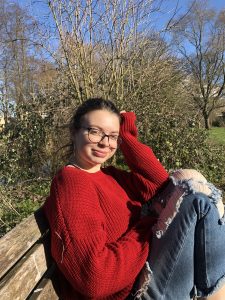
Liz and I pausing to enjoy the Spring sun on our regular 30 minute walk back from our
Sociology lecture at Mill Hall.
British Life and Culture (Valparaiso University)
Thesis: Both Ludwig Wittgenstein and Virginia Woolf were obsessed with language and its contradictions. It is the philosophical experience of exploring the incomprehensible that inspired the prolific and profound words of both Wittgenstein and Woolf, despite—or perhaps even because of—those indiscernible areas where logical language falls short.
New Testament Epistles (Cambridge Theological Federation)
Thesis: The Apostle Paul saw the Old Testament’s role in the Early Church as a foundation for Christian community, but he did not believe it to be the foundation for salvation. In relation to today’s Church, Paul’s perspective of the Law ought to remind Christian leaders to continually make certain that their teachings are in line with Jesus’ gospel (i.e., to bring salvation to all people), rather than in line with the Covenant (i.e., to bring salvation to select people).
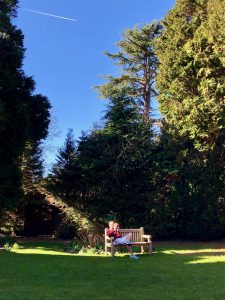
Nolan casually reading a book before our Theo lecture at Ridley Hall.
British Science Fiction (Westfield House)
This was the only course that did not have a final paper but instead an in-class short essay exam as the main (pretty much only) grade. Unsurprisingly, we studied a lot of novels in this course. With only four students in the class we all collectively read Mary Shelley’s Frankenstein, and then each proceeded to read four different novels that we would then present on to the class. I really, genuinely enjoyed almost all of the books I read: The Time Machine by H.G. Wells, Starmaker by Olaf Stapledon, A Clockwork Orange by Anthony Burgess, and The Power by Naomi Alderman (the last two being my favorite by far, and which I highly recommend!).
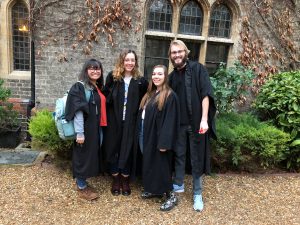
Jasmine, Demi, Nolan, and I posing in our House Robes in front of Westfield House
before class and weekly House Chapel and Tea (Taken on our first day of British
Science Fiction!).
Leave a Reply